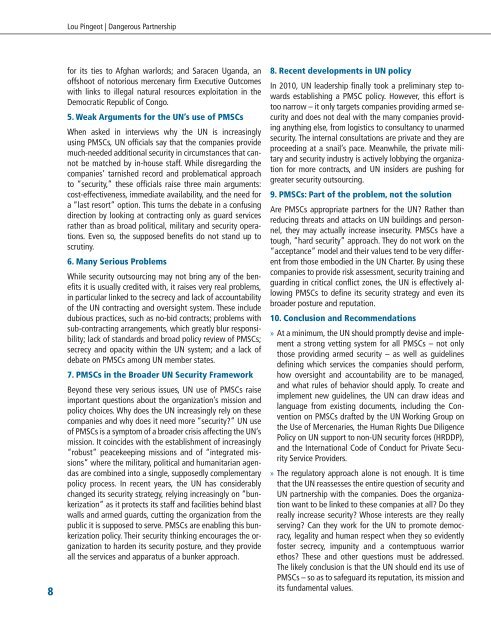Dangerous Partnership - Global Policy Forum
Dangerous Partnership - Global Policy Forum
Dangerous Partnership - Global Policy Forum
You also want an ePaper? Increase the reach of your titles
YUMPU automatically turns print PDFs into web optimized ePapers that Google loves.
Lou Pingeot | <strong>Dangerous</strong> <strong>Partnership</strong><br />
8<br />
for its ties to Afghan warlords; and Saracen Uganda, an<br />
offshoot of notorious mercenary firm Executive Outcomes<br />
with links to illegal natural resources exploitation in the<br />
Democratic Republic of Congo.<br />
5. Weak Arguments for the UN’s use of PMSCs<br />
When asked in interviews why the UN is increasingly<br />
using PMSCs, UN officials say that the companies provide<br />
much-needed additional security in circumstances that cannot<br />
be matched by in-house staff. While disregarding the<br />
companies’ tarnished record and problematical approach<br />
to “security,” these officials raise three main arguments:<br />
cost-effectiveness, immediate availability, and the need for<br />
a “last resort” option. This turns the debate in a confusing<br />
direction by looking at contracting only as guard services<br />
rather than as broad political, military and security operations.<br />
Even so, the supposed benefits do not stand up to<br />
scrutiny.<br />
6. Many Serious Problems<br />
While security outsourcing may not bring any of the benefits<br />
it is usually credited with, it raises very real problems,<br />
in particular linked to the secrecy and lack of accountability<br />
of the UN contracting and oversight system. These include<br />
dubious practices, such as no-bid contracts; problems with<br />
sub-contracting arrangements, which greatly blur responsibility;<br />
lack of standards and broad policy review of PMSCs;<br />
secrecy and opacity within the UN system; and a lack of<br />
debate on PMSCs among UN member states.<br />
7. PMSCs in the Broader UN Security Framework<br />
Beyond these very serious issues, UN use of PMSCs raise<br />
important questions about the organization’s mission and<br />
policy choices. Why does the UN increasingly rely on these<br />
companies and why does it need more “security?” UN use<br />
of PMSCs is a symptom of a broader crisis affecting the UN’s<br />
mission. It coincides with the establishment of increasingly<br />
“robust” peacekeeping missions and of “integrated missions”<br />
where the military, political and humanitarian agendas<br />
are combined into a single, supposedly complementary<br />
policy process. In recent years, the UN has considerably<br />
changed its security strategy, relying increasingly on “bunkerization”<br />
as it protects its staff and facilities behind blast<br />
walls and armed guards, cutting the organization from the<br />
public it is supposed to serve. PMSCs are enabling this bunkerization<br />
policy. Their security thinking encourages the organization<br />
to harden its security posture, and they provide<br />
all the services and apparatus of a bunker approach.<br />
8. Recent developments in UN policy<br />
In 2010, UN leadership finally took a preliminary step towards<br />
establishing a PMSC policy. However, this effort is<br />
too narrow – it only targets companies providing armed security<br />
and does not deal with the many companies providing<br />
anything else, from logistics to consultancy to unarmed<br />
security. The internal consultations are private and they are<br />
proceeding at a snail’s pace. Meanwhile, the private military<br />
and security industry is actively lobbying the organization<br />
for more contracts, and UN insiders are pushing for<br />
greater security outsourcing.<br />
9. PMSCs: Part of the problem, not the solution<br />
Are PMSCs appropriate partners for the UN? Rather than<br />
reducing threats and attacks on UN buildings and personnel,<br />
they may actually increase insecurity. PMSCs have a<br />
tough, “hard security” approach. They do not work on the<br />
“acceptance” model and their values tend to be very different<br />
from those embodied in the UN Charter. By using these<br />
companies to provide risk assessment, security training and<br />
guarding in critical conflict zones, the UN is effectively allowing<br />
PMSCs to define its security strategy and even its<br />
broader posture and reputation.<br />
10. Conclusion and Recommendations<br />
»»<br />
At a minimum, the UN should promptly devise and implement<br />
a strong vetting system for all PMSCs – not only<br />
those providing armed security – as well as guidelines<br />
defining which services the companies should perform,<br />
how oversight and accountability are to be managed,<br />
and what rules of behavior should apply. To create and<br />
implement new guidelines, the UN can draw ideas and<br />
language from existing documents, including the Convention<br />
on PMSCs drafted by the UN Working Group on<br />
the Use of Mercenaries, the Human Rights Due Diligence<br />
<strong>Policy</strong> on UN support to non-UN security forces (HRDDP),<br />
and the International Code of Conduct for Private Security<br />
Service Providers.<br />
» » The regulatory approach alone is not enough. It is time<br />
that the UN reassesses the entire question of security and<br />
UN partnership with the companies. Does the organization<br />
want to be linked to these companies at all? Do they<br />
really increase security? Whose interests are they really<br />
serving? Can they work for the UN to promote democracy,<br />
legality and human respect when they so evidently<br />
foster secrecy, impunity and a contemptuous warrior<br />
ethos? These and other questions must be addressed.<br />
The likely conclusion is that the UN should end its use of<br />
PMSCs – so as to safeguard its reputation, its mission and<br />
its fundamental values.


